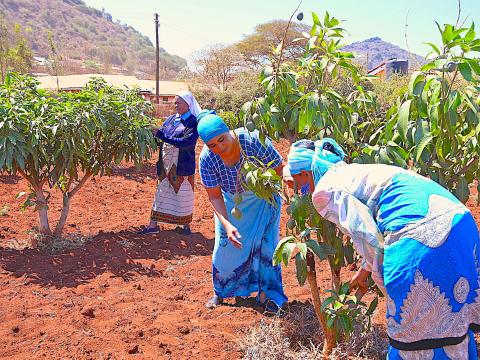Women groups save key forest to tackle climate change in northern Kenya

By Sarah Ooko, World Vision Senior Communications & Media Officer, Kenya
Marsabit Forest in northern Kenya is home to numerous tree species, which are well adapted to the high temperatures and harsh climatic conditions experienced in the area.
As a typical tropical dry forest, most of its trees either shed their leaves or make them wilt in times of drought or long dry seasons.
During these periods, which increasingly run for most part of the year due to climate change, the forest usually appears ‘dead’ or dull. This is unlike tropical rain forests whose trees are usually green and vibrant throughout the year.

Because of its lacklustre appearance, the forest has been largely neglected by communities over the years, with many only seeing it as a source of wood for charcoal production that they sell for profit.
This has led to massive destruction and loss of the forest, which is a key water catchment area that a majority of Marsabit County residents rely on. The deforestation has also worsened the adverse effects of climate change, leading to unreliable and insufficient rainfall that affect crop and livestock farming.
To tackle this challenge and save the forest, World Vision in partnership with the Kenya Forestry Service (KFS) has been sensitising the community on climate change, offering training on afforestation initiatives and helping them to find alternative sources of livelihoods that do not destroy the forest. This initiative is anchored on the organisation's Regreening Africa project that World Vision is implementing in collaboration with the World Agroforestry though funding from the European Union (EU), as well as the FMNR Scale-Up project funded by GIZ.

These initiatives target vulnerable members of the community, especially women, who have been worst hit by climate change. Among them, is Joyce who is in her 50s. She is leading her community - through the Songa Women Group - to save the Marsabit forest which is under threat from deforestation as people cut down trees for charcoal production.
"As women, we used to cut a lot of trees in the forest for charcoal burning, since the frequent droughts made it impossible for us to rely solely on crop or livestock farming. But we didn't know that it was the cutting of trees that had contributed to the farming problems we were facing. The training opened our eyes to this reality," she says.

As an alternative to the charcoal production, the women have been trained on fruit tree planting and encouraged to embrace it.
"I have mango, pawpaw, avocado and lemon trees which give us different varieties of fruits. I have integrated them with vegetables, which have enhanced the nutrition status of my children and family. I also sell them to get money for other basic needs," says Joyce.

Thanks to the extensive training on tree planting, Joyce also has a well-established nursery with seedlings of various fruit trees, as well as indigenous tree species that are being replanted in the forest to replace those previously cut.
Joyce’s farm is a training ground for different women groups in her community who she has empowered and nurtured to become environmental conservation and tree planting champions just like her.

The women have taken it upon themselves to watch over the forest and prevent further deforestation and damage to the ecosystem. They know that their efforts will go a long way in helping them mitigate climate change and avert its devastating effects.
In addition to tree planting, the women also encourage the growth of more indigenous trees in the forest through the Farmer Managed Natural Regeneration (FMNR) model, which boosts tree growth through effective pruning techniques.

These women are also nurturing a generation of young environmental champions by encouraging the youth to channel their energy into tree planting which gives them 'clean' sources of income and safeguards their future from climate change effects.
A majority of these young people had given up on life due to limited job opportunities, with many resorting to alcoholism to escape the problems or engaging in crime to get money through illegal means.

"We are happy with these tree planting initiatives as there is a ready market for our seedlings. This initiative has also given us a purpose in life, because we know that the trees we are planting in our homes and in the forest will change lives in this community and benefit future generations too," says Godfrey, the leader of the Nywakinot youth group in Marsabit County.
Besides the tree planting, World Vision has also supported women groups in Marsabit County to acquire knowledge on beekeeping which thrives with increased tree cover.

Beekeeping is helping families to become resilient to frequent droughts as they are able to still harvest honey during dry seasons and generate income.
"Because of the empowerment from World Vision, we now know the benefits of trees and do not take them for granted. We are also getting enough income from planting trees or conserving existing ones in our homes. This has kept people off the forest, giving it time to recover from the destruction that has been happening over the years," says Hadija, the chair of one of the women’s group (Chorora) that benefitted from the beekeeping training.